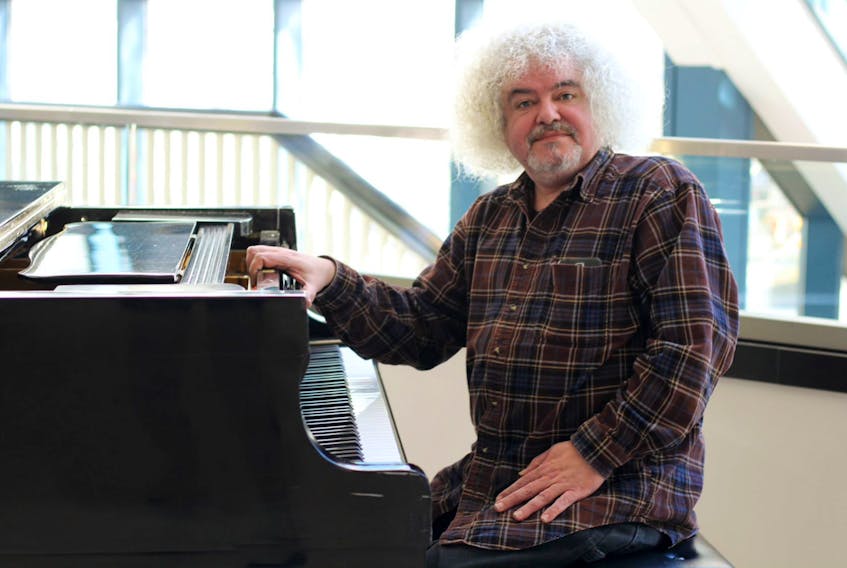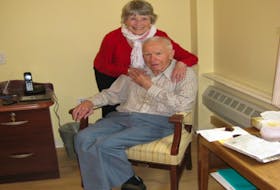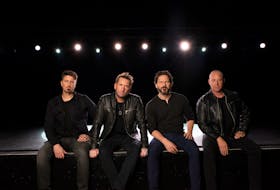ST. JOHN'S, N.L. — His fingers flying across the piano key train tracks, Richard Herriott’s performance of his original composition, “The Newfie Bullet,” with the Newfoundland Symphony Orchestra (NSO) in November was the result of many years of work.
Only the second performance of the concerto — the first being in Toronto in 2017 — Herriott’s composition of the piece actually began when he was a teenager, and saw progress and pauses, inclusions and exclusions between then and its NSO debut.
“One variation didn’t make it into the final, and it was a difficult decision to make,” Herriott explained to The Telegram after the concert. “The material I came up with (in the final version), I think, is stronger, and that’s what happens when you write. You sometimes wind up sacrificing, but that’s OK. I think if you can’t allow yourself to grow as a musician, then there’s not much point in doing it. It’s like any kind of pursuit in life, really.”
Herriott’s artistic sacrifice took a devastating turn just three days later. Having returned to Toronto, an electrical fire broke out in the basement of his apartment building early in the morning, leaving him minutes to escape before his flat and others were engulfed in flames. Everything was destroyed — his keyboard, scores, manuscripts and other personal items.
Herriott, born in Singapore but raised in England for his first few years, came to Canada in 1967, when his father — teacher/composer/musician John Herriott — took a job in Toronto. The family moved to Newfoundland when Herriott was nine.
Herriott won his first piano competition at age 10, then got involved with the Kiwanis Music Festival and eventually made a radio recital debut on CBC in 1976. He went on to study at Toronto’s Royal Conservatory, and, until his performance with the NSO in November, had last stepped onto the St. John’s Arts and Culture Centre stage as part of a recital tour of Eastern Canada in 1984.
“The Newfie Bullet” started as a student work, after Herriott and his piano teacher at the Royal Conservatory realized he was about 10 minutes short in a recital program. She suggested he throw in Samuel Barber’s “Excursions,” but he hated them because everyone was playing them at the time.
“I said, 'Give me 24 hours and I’ll come back with something,'” Herriott said. “I went back to the student residence where I was staying, which had a piano in the basement. I hid away down there with a case of beer. I was about 18. I got to work and I came up with this thing called ‘Three Short Diversions on Newfoundland Folksong.’”
The piece went over well and was then cast aside as Herriott finished his studies. He moved back to England, where he earned his acknowledgement as one of the leading pianists for dance accompaniment, working with the Northern Ballet, the Royal Ballet, the English National Ballet and others before returning to Canada in 2012. He continues to accompany classes at the National Ballet of Canada and the National Ballet School, performing live music for ballet and contemporary dance classes. The teacher sets an exercise and Herriott, in a matter of seconds, works out a piece of music to support the dancers.
“A lot of people use books, but that kind of stuff gets in the way,” he said. “I think if you’re directly involved with what’s going on in class, you’re much more supportive.”
The classes allow Herriott the opportunity to work on pieces he later uses to create bigger compositions, and such is the case with “The Newfie Bullet,” which he picked up again five years ago on the suggestion of conductor and friend Kevin Mallon.
“I thought it was great, yeah,” Herriott said. “I got to work on it and he said to me, ‘We’ll do it in Toronto with the hopes that Newfoundland will find out about it. And that’s exactly what happened.”
Six months after its premiere at the Toronto Centre for the Arts with Mallon and Orchestra Toronto, Herriott received a message from NSO conductor Marc David. On Nov. 15, in a program that also featured his brothers Chuck, an actor, and Mike, a trumpeter, as well as his sister-in-law, cellist Ofra Harnoy, Herriott presented “The Newfie Bullet” to a rapt audience and a standing ovation.
“The Newfie Bullet,” like its passenger train namesake, offered a rolling journey from Port aux Basques to St. John’s. Beginning with a ballet-appropriate rhythmic playfulness and then progressing into something all-encompassing, the concerto created an audio passage through location and time. There’s a section that clearly involves a lighthouse foghorn; Herriott has nicknamed another section “The Rowdyman,” after the Gordon Pinsent movie. There’s a chord meant to cheekily sound like the teleporter in “Star Trek.”
“I wanted it to sound like the train has already taken off and we’re at the second station. It’s like the train’s coming and when it finally arrives at the station it’s larger than life and it comes rushing in. That’s when the piano comes in,” Herriott explained. “It goes back in time when Newfoundland was just discovered, and I suppose you could say there’s some sort of travel romance in it, as well. Then there’s the ‘Beam me up, Scotty’ chord that takes us back into the 21st century, passing by one of those little white churches around that bay. The last bit is the journey into St. John’s.”
Herriott said he was determined to present a distinctly Newfoundland flavour in a non-patronizing way. He doesn’t believe in writing music to antagonize audiences.
“It’s nice to have some sort of struggle in the music so there’s contrast and everything else, but if the music is always like that, then it’s self-defeating,” he said. “I think, why do that? It’s ugly to play and it’s ugly to listen to and it doesn’t serve any purpose.
“I get criticized sometimes because my music is very tonal and I suppose it’s maybe slightly old-fashioned, but the thing that’s most important for me is that anybody in the audience, not just musicians, can feel they’re part of it.”
Since losing his possessions in the fire, Herriott has been working to settle himself again. While his handwritten scores have been destroyed, Orchestra Toronto and the NSO have digital copies of “The Newfie Bullet” and a rock concerto, based on the music of the 70s and in particular, Herriott’s beloved Emerson, Lake and Palmer. He’ll soon have a new keyboard and his laptop may be salvageable, he said, and he has just moved into a new place he loves. Some things, unfortunately, are irreplaceable, while others will take time to replace, he said.
Hours after hearing the news of the blaze, members of Orchestra Toronto launched a GoFundMe campaign to help Herriott rebuild. The support has given him a humbling realization of his place in the music community.
“I’m enormously grateful,” he said. “It’s very, very powerful and very helpful.”
Herriott said he has accepted that he won’t immediately overcome the trauma, but has decided to embrace it as a means of dealing with it and moving on down the track.
“My feeling is that I have to think about it,” he explained. “And I suppose it goes with my sense of adventure.”
[email protected]
Twitter: @tara_bradbury









